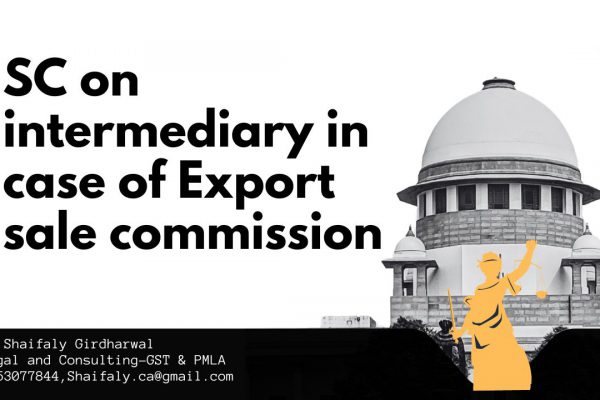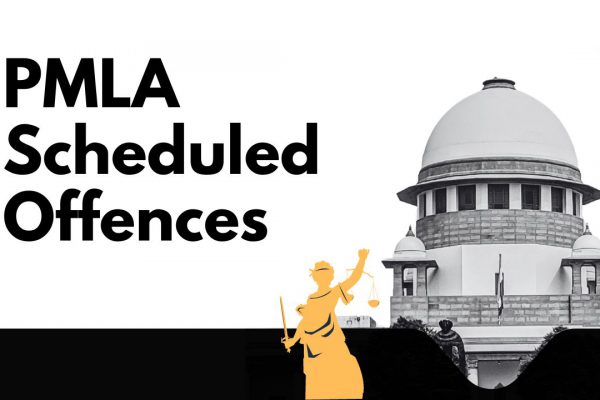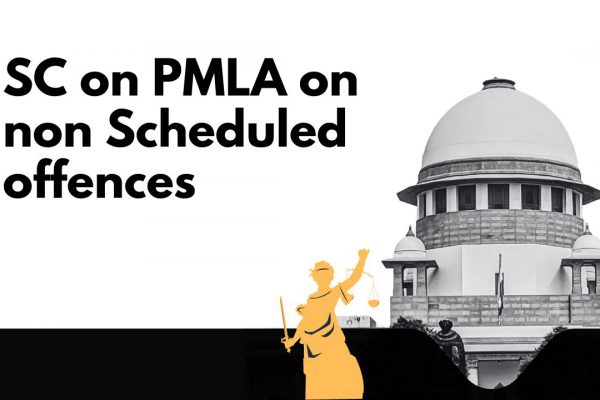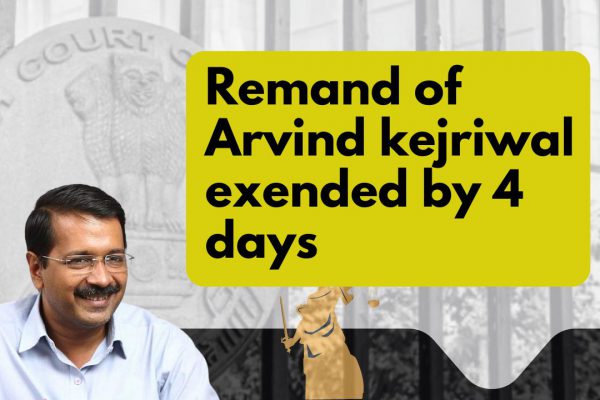Important ruling for place of supply in GST for Exports
Important ruling for place of supply in GST for Exports:
In the advance ruling of M/s Segoma India place of supply in GST for Exports is discussed.
Section 2(6) of IGST provide the definition of Export of service from India.
“export of services” means the supply of any service when,––
(i) the supplier of service is located in India;
(ii) the recipient of service is located outside India;
(iii) the place of supply of service is outside India;
(iv) the payment for such service has been received by the supplier of service in convertible foreign exchange; and
(v) the supplier of service and the recipient of service are not merely establishments of a distinct person in accordance with Explanation 1 in section 8;
One of the factor to decide whether a supply is an export or not, is place os supply. In GST section 13 of IGST Act provide for the place of supply for services. This section applies when any of supplier or recipient is located outside India.
Segoma imaging technologies, India: applicability of section 13(3) of IGST:
In case of M/s Segoma imaging technologies the issue of place of supply is discussed at length. Let us have a look on the issue addressed by advance ruling.
- R2Net is a company based in US.
- Segoma Israel is 100% subsidiary of R2Net (Located in Israel)
- Segoma Imaging tech (India) is 100% subsidiary of Segoma Israel
Segoma India is required to click the pictures of diamonds made available by customers of R2Net. These pictures are then uploaded in the software of R2Net. Sigoma India issues memo to clients and diamonds move on delivery challan. Segoma India charges Segoma Israel for their services.
Query Raised: Two important issues observed by the authority.
- Applicability of section 13(3)(a)
Query raised before the authority was that the services delivered by Semoga India are export or not. The applicant referred the section 13(3)(a) and Section 13(8) of IGST were discussed at length. Applicant explained the provisions of both sections and also discussed why none of them is applicable in their case. Decided cases on intermediary were also discussed. Applicant provided reference of Godaddy case for intermediary.
At the end the authority observed that the provisions of section 13(3)(a) would be relevant in this case. Let us discuss these provisions and their applicability on this particular case.
Section 13(2) (a) provide for the place of supply when:
- Any of supplier or recipient is located outside India
- Services are provided on Goods and physical presence of goods is necessary for providing the services.
Let us have a look on text of section itself.
“Section 13 (3) The place of supply of the following services shall be the location where the services are actually performed, namely:—
- services supplied in respect of goods which are required to be made physically available by the recipient of services to the supplier of services, or to a person acting on behalf of the supplier of services in order to provide the services”
The applicant pleads that his case won’t fall in this section because the goods are not owned or provided by the recipient himself. Definition of recipient was also reproduced and referred to make their point. In their case the goods are made available by a third person.
The authority observed that the language of this section is clear. The recipient made all the arrangements to make the diamonds available to the Semoga India. Thus it is assumed that recipient makes goods available only. The text of observation of authority is reproduced here: It is very interesting and very well compiled.
“The main contention of the applicant for non-applicability of section 13 (3) (a) of the IGST Act regarding determination of place of supply is that the goods which are required to be made physically available must be owned or made available only by the recipient of services. This line of argument in this respect is hard to accept and is not tenable. However from the plain reading of subsection (a) of subsection 3 of section 13 of the IGST Act, we do not agree with the contention of the applicant that the goods that are required for rendering service by the supplier must be owned or made available only by the recipient of services. As per above clause, recipient of service who want to avail services has to make goods physically available on direct or indirect directions to the service provider and it does not matter who owned the goods. Accepting the proposition of law and its interpretation as made by the applicant, would clearly amount to addition of words which are absent in the provisions.
In our view where words of the statute are clear, plain and unambiguous then it must be given their ordinary meaning.
It is the cordial rule of interpretation that where the language used by the legislature is clear and unambiguous then the plain and natural meaning of the words should be supplied to the language used and resort to any rule of interpretation to unfold the intention is permissible only where there is any ambiguity. Plethora of decisions of the Apex Court are there to support the proposition, for e.g. Smt. Tarulata Shyam Vs CIT 108 ITR 345 (SC). This concept is explained in detail by the Hon. SC in M/S. Grasim Industries Ltd. vs Collector of Customs, Bombay on 4 April, 2002 in Appeal (Civil) 1951 of 1998.
The court held that –
“The elementary principle of interpreting any word while considering a statute is to gather the mens or sententia legis of the legislature. Where the words are clear and there is no obscurity, and there is no ambiguity and the intention of the legislature is clearly conveyed, there is no scope for the Court to take upon itself the task of amending or alternating the statutory provisions. Wherever the language is clear the intention of the legislature is to be gathered from the language used. While doing so what has been said in the statute as also what has not been said has to be noted. The construction which requires for its support addition or substitution of words or which results in rejection of words has to be avoided.”
Keeping in mind this proposition we are of the view that there is no need that the goods physically required for rendering services must be owned by the recipient of the services, on the other hand it is sufficient for the recipient to make them physically available to the service provider for rendering services.
Thus in this case the event of photography services pertaining to diamonds made physically available by the recipient of services to the provider of services is over and the service is clearly provided in India where the services are actually performed.”
Whether Semoga India is an establishment of R2Net:
The another issue discussed is whether the relationship of Semoga India and R2Net is of establishment of distinct person. The condition (v) of the definition of ‘export of services’ as per section 2(6) reads as: ‘the supplier of service and the recipient of service are not merely establishment of a distinct person in accordance with Explanation 1 in section 8. In this context the authority observed that Semoga India doesn’t have independence to chose the technology and they need to click photographs using the technology and instructions of R2Net. They are an establishment of R2Net irrespective of fact that it is a company formed under Indian companies Act. The text of relevant portion from the ruling is reproduced here.
“As per this condition the supplier of service and recipient of service should be separate legal person and not mere an establishment of distinct person. In the present case, it is observed that R2Net, which is based in USA and Segoma Israel, is its subsidiary. Further Segoma India is a subsidiary of Segoma Israel. So also we find that as per agreement between R2Net and their customer, R2Net lists on the system only those diamonds that are photographed with its proprietary Diamond Display Technology – Segoma.
Thus applicant does not have liberty to photograph and upload images except those finalized by R2Net. In view of this it appears that applicant is carrying on business in Indian territory as a representational office of Segoma Israel and thus is covered by Explanation 1 of Section 8 of the IGST Act. Applicant’s submission in this regard is that they are established under the Indian Companies Act having separate PAN number and therefore it is not a branch, agency or representational office of Segoma Israel.”
Two very important issues are discussed and decided by the authority. The ruling in case of M/s Segoma Imaging technologies India Private Ltd. Will be a landmark for place of supply related issues.
Author can be contacted at info@consultease.com
If you already have a premium membership, Sign In.
 CA Shafaly Girdharwal
CA Shafaly Girdharwal
CA
New Delhi, India
CA Shaifaly Girdharwal is a GST consultant, Author, Trainer and a famous You tuber. She has taken many seminars on various topics of GST. She is Partner at Ashu Dalmia & Associates and heading the Indirect Tax department. She has authored a book on GST published by Taxmann.

























